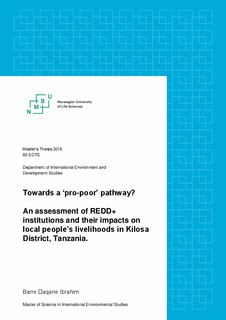| dc.description.abstract | REDD+ aims to reduce deforestation and forest degradation in the developing countries. Forests and related resources are important sources of income for rural households. Kilosa district is one area in Tanzania where the REDD+ initiative was introduced. The pilot project started in 2010 and ended in 2014. This study aims at ‘taking stock’ of REDD+ in terms of discovering whether the intervention had any impact on local people’s livelihoods in Kilosa district. More specifically, the study evaluates changes in local institutions, people’s evaluation of these changes and the possible impacts of REDD+ on people’s livelihoods. The study is part of the ‘Man and Forests’ project which was funded by the Norwegian Research Council in 2014.
This study employed two theoretical frameworks, namely the environmental governance systems framework and the rural livelihoods framework. In terms of methodology, the study used BACI (before-after-control-impact) design whereby both qualitative and quantitative research methods were used. Following this methodology, field data from Kilosa district was collected from two pilot villages (Nyali and Lunenzi) and two control villages (Zombo and Lumango) in 2010 and 2015. Field data included household surveys and qualitative data. Additionally, the study used literature from secondary sources and archives.
Qualitative data was used to assess the changes in institutions and the local people’s evaluation of the changes. The results from these data showed a shift of property rights, from state property to common property, in the pilot villages. Moreover, there were changes in formal rules regarding use of forest and related resources in these two villages. Despite the existence of the formal rules, illegal timber logging and charcoal making were common activities in Nyali in both periods. Regarding control villages, there were no changes in property rights, as one would expect. Rules for use of resources have also not changed since 2010. However, it was observed that use of resources was de facto under open access in 2015 as was the case in 2010.
When it comes to local people’s evaluations of the institutional changes, it was discovered that majority of the informants in the pilot villages were satisfied with the REDD+ as well as the pre-REDD+ rules. The two main reasons for satisfaction with the pre-REDD+ rules in both villages were equal distribution of resource use and benefits and good accessibility to resources. However, it seems that people in Lunenzi were more positive to the pre-REDD+ compared to those in Nyali. Additionally, the results suggested weaker forest governance in Nyali compared to Lunenzi in 2010. In terms of REDD+ rules, the two main reasons for satisfaction were issues such as clear boundaries and people’s participation in making rules. Concerning variations across the villages, the results showed that people in Lunenzi were more positive than those in Nyali as was the case in 2010. In addition, forest governance was still better in Lunenzi in 2015 compared to Nyali. Nevertheless, it was noted that forest governance had improved in Nyali in 2015 compared to 2010.
The results from the surveys reveal severe reductions in gross total household incomes in both pilot and control villages between the two study periods. Moreover, there were reductions in most of the income categories. This is mainly because of drought that hit these villages in 2014. To test whether REDD+ has had a role to play in this respect, panel data analysis was done for gross total household incomes, total forest incomes and total farmed area. Results from the panel data analysis showed that REDD+ did not have significant effect on local people’s gross total income and total farmed area. Interestingly, REDD+ had a positive impact on total forest income.
The thesis recommends national policies for poverty alleviation in Kilosa district and beyond. It further proposes an increase in alternative livelihoods and agricultural investments in the REDD+ pilot villages in order to reduce deforestation. | |

